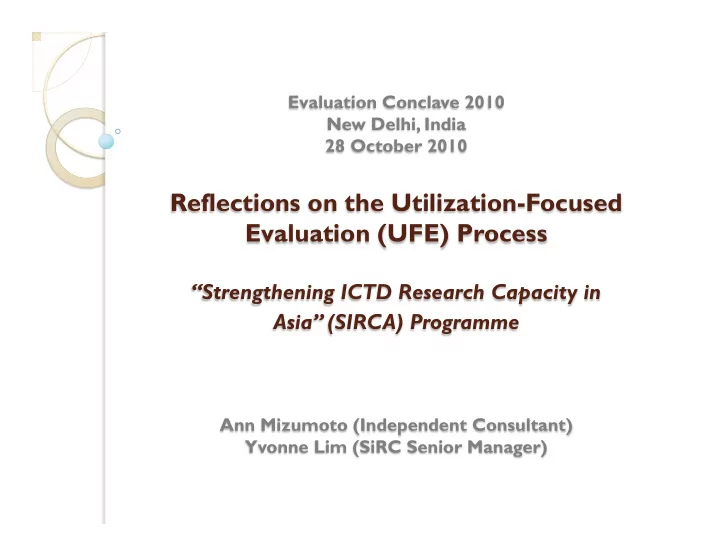

Evaluation Conclave 2010 New Delhi, India 28 October 2010 Reflections on the Utilization-Focused Evaluation (UFE) Process “Strengthening ICTD Research Capacity in Asia” (SIRCA) Programme Ann Mizumoto (Independent Consultant) Yvonne Lim (SiRC Senior Manager)
SIRCA Programme (1) Funded by the International Development Resarch Centre (IDRC), Canada Administered by Singapore Internet Research Center (SiRC), Nanyang Technological University, Singapore 14 research projects for 3 grant categories (Bangladesh, Cambodia, China, India, Nepal, Philippines, Singapore, Sri Lanka, Vietnam )
SIRCA Programme (2) Research projects on Information and Communication Technology for Development (ICT4D) Project length: 12 to 24 months Key Features: ◦ Mentorship Programme ◦ Graduate Student Award Programme ◦ Capacity Building Workshops ◦ Dissemination Conferences
SIRCA Key Objectives Enhance research capacity in Asia through rigorous academic research Create a space for dialogue on ICT4D social science research issues in Asia Create linkages through a mentorship program Disseminate findings in publications and conferences
SIRCA Evaluation First time to commission an evaluation Evaluation period: Mar 2008 – July 2010 (2 yrs, 4 mos) Formative evaluation: Identify areas for improvement in operations, activities, and provide actionable recommendations to staff and senior management Utilization-Focused Evaluation(UFE): Participatory evaluation approach, focus on use of the findings by evaluation’s primary users
UFE Learnings (1) Establish common understanding and expectations ◦ UFE Primary Users vs non-Primary Users vs Important Stakeholders – Primary Users should have the final say ◦ Time commitment ◦ Face-to-face meeting with evaluator always helps!
UFE Learnings (2) Do not hurry ◦ Identify the Primary Users: Get individuals who are committed, knowledgeable, care about the evaluation, “personal factor” ◦ Identify the Primary Uses of the evaluation ◦ Identify potential Evaluation Areas
UFE Learnings (3) Participation of Primary Users is crucial ◦ Knowledge of history, challenges, internal politics ◦ Involvement in UFE Steps 1 – 12 (key evaluation questions, evaluation design, data collection methods, analysis and interpretation of findings, generation of recommendations, using the findings) ◦ Understanding of findings à sense of ownership of the evaluation à higher probability of using the evaluation
UFE Challenges (1) Primary Users have other job priorities – UFE is time consuming Primary Users lose interest, drop out Staff turnover – lose continuity of knowledge and experience, changes in evaluation areas and delays in process Change of mindset - evaluator is not the typical outsider/external auditor but a facilitator and trusted advisor The evaluation should be “objective”?
UFE Challenges (2) Evaluator doesn’t have the answer to everything “I find that when I enter a new program setting as an external evaluator, the people with whom I’m working typically expect me to tell them what the focus of the evaluation will be. They’re passively waiting to be told by the evaluation expert – me – what questions the evaluation will answer. But I don’t come with specific evaluation questions. I come with a process for determining what questions will be meaningful and what answers will be useful given the program’s situation, priorities, and decision context. Taking them through the process of formulating questions and determining evaluation priorities is aimed at engendering their commitment to data-based evaluation and use.” (Michael Quinn Patton, UFE, 4 th edition, p.49)
Evaluation is over…but there’s a lasting outcome... Internal capacity is built! ◦ Infused evaluative thinking into organization - Primary Users, staff and senior management more mindful of the processes and systems of SIRCA ◦ Assisted new personnel in adapting quickly into the organization, particularly if they became Primary Users ◦ Stimulated new ideas for programme ◦ Learned to critically analyze, identify and anticipate programme challenges ◦ Conscious of monitoring mechanisms and indicators ◦ Learned how to conduct, review and manage future evaluations
Thank You
Recommend
More recommend